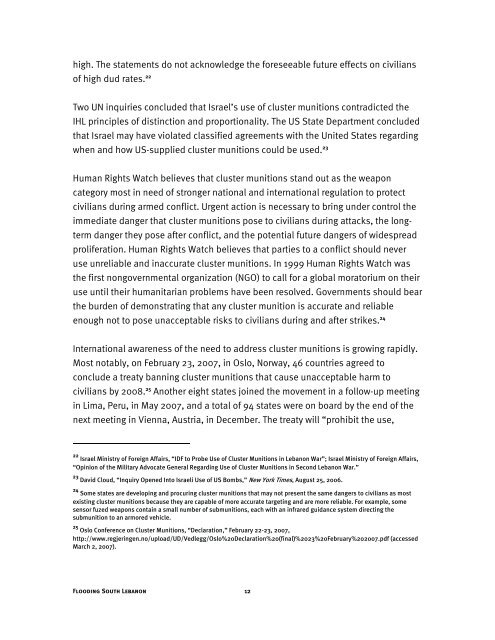Flooding South Lebanon - Human Rights Watch
Flooding South Lebanon - Human Rights Watch
Flooding South Lebanon - Human Rights Watch
You also want an ePaper? Increase the reach of your titles
YUMPU automatically turns print PDFs into web optimized ePapers that Google loves.
high. The statements do not acknowledge the foreseeable future effects on civilians<br />
of high dud rates. 22<br />
Two UN inquiries concluded that Israel’s use of cluster munitions contradicted the<br />
IHL principles of distinction and proportionality. The US State Department concluded<br />
that Israel may have violated classified agreements with the United States regarding<br />
when and how US-supplied cluster munitions could be used. 23<br />
<strong>Human</strong> <strong>Rights</strong> <strong>Watch</strong> believes that cluster munitions stand out as the weapon<br />
category most in need of stronger national and international regulation to protect<br />
civilians during armed conflict. Urgent action is necessary to bring under control the<br />
immediate danger that cluster munitions pose to civilians during attacks, the longterm<br />
danger they pose after conflict, and the potential future dangers of widespread<br />
proliferation. <strong>Human</strong> <strong>Rights</strong> <strong>Watch</strong> believes that parties to a conflict should never<br />
use unreliable and inaccurate cluster munitions. In 1999 <strong>Human</strong> <strong>Rights</strong> <strong>Watch</strong> was<br />
the first nongovernmental organization (NGO) to call for a global moratorium on their<br />
use until their humanitarian problems have been resolved. Governments should bear<br />
the burden of demonstrating that any cluster munition is accurate and reliable<br />
enough not to pose unacceptable risks to civilians during and after strikes. 24<br />
International awareness of the need to address cluster munitions is growing rapidly.<br />
Most notably, on February 23, 2007, in Oslo, Norway, 46 countries agreed to<br />
conclude a treaty banning cluster munitions that cause unacceptable harm to<br />
civilians by 2008. 25 Another eight states joined the movement in a follow-up meeting<br />
in Lima, Peru, in May 2007, and a total of 94 states were on board by the end of the<br />
next meeting in Vienna, Austria, in December. The treaty will “prohibit the use,<br />
22 Israel Ministry of Foreign Affairs, “IDF to Probe Use of Cluster Munitions in <strong>Lebanon</strong> War”; Israel Ministry of Foreign Affairs,<br />
“Opinion of the Military Advocate General Regarding Use of Cluster Munitions in Second <strong>Lebanon</strong> War.”<br />
23 David Cloud, “Inquiry Opened Into Israeli Use of US Bombs,” New York Times, August 25, 2006.<br />
24 Some states are developing and procuring cluster munitions that may not present the same dangers to civilians as most<br />
existing cluster munitions because they are capable of more accurate targeting and are more reliable. For example, some<br />
sensor fuzed weapons contain a small number of submunitions, each with an infrared guidance system directing the<br />
submunition to an armored vehicle.<br />
25 Oslo Conference on Cluster Munitions, “Declaration,” February 22-23, 2007,<br />
http://www.regjeringen.no/upload/UD/Vedlegg/Oslo%20Declaration%20(final)%2023%20February%202007.pdf (accessed<br />
March 2, 2007).<br />
<strong>Flooding</strong> <strong>South</strong> <strong>Lebanon</strong> 12
















